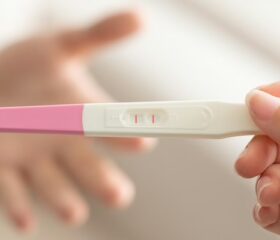How to Track Ovulation with Polycystic Ovary Syndrome (PCOS)
Many women with polycystic ovary syndrome (PCOS) struggle to tell when they’re ovulating, which, in turn, makes it hard to tell when they’re fertile each month.

Polycystic ovary syndrome (PCOS) is a common hormonal condition that affects roughly one in ten women of reproductive age. 1 It’s one of the leading causes of infertility, primarily because it disrupts regular ovulation, leading to irregular menstrual cycles.
Irregular periods make it hard to predict when you’re due to ovulate (or if you usually even ovulate at all). Many of the methods you’d normally use to track ovulation, like ovulation calculators, won’t work when you have PCOS.
However, it’s still possible to track ovulation with PCOS and find out when you’re most fertile—it’s just harder. Read on to learn how PCOS affects ovulation and which fertility tracking methods you can still use.
How does PCOS affect ovulation?
When you have PCOS, your ovaries develop cysts (small fluid-filled sacs) that produce hormones called androgens.
Men naturally have more androgens (e.g., testosterone) than women, but if you have PCOS, you’ll have elevated levels of these hormones. This can disrupt the development and release of a mature egg from one of your ovaries. 2
Moreover, many women with PCOS also have insulin resistance, where the body can’t regulate blood sugar efficiently. High insulin levels can further stimulate the ovaries to produce more androgens.
How does polycystic ovary syndrome affect ovulation tracking?
Right before most women start ovulating, their bodies begin producing luteinizing hormone (LH), which stimulates one of the ovaries to release a mature egg for fertilization. Most ovulation tests look for this LH surge, which often occurs within 16–48 hours of ovulation. 3
However, many women with PCOS have chronically elevated levels of LH, so it becomes very difficult to identify this surge. 4 If that’s the case for you, you may see a faint positive result on your ovulation test even when you aren’t actually ovulating.
Can you still ovulate if you have PCOS?
Yes—while many women with PCOS do have issues with ovulation, that doesn’t necessarily mean you’ll never ovulate at all (although your monthly cycle may be irregular and you may sometimes “skip” months).
If your ovaries can mature and release eggs, it’ll be possible for you to get pregnant naturally with PCOS. Even if that proves difficult or impossible, you may be able to conceive if you receive fertility treatments.
How to track ovulation with PCOS with fertility tracking apps
If you want to get to grips with your cycle when you have PCOS, a fertility tracking app is probably the best place to start. These apps let you log your ovulation symptoms from month to month.
Even if PCOS is causing irregular periods, you may still be able to identify patterns in your cycles.
When tracking ovulation with PCOS, you’re best off using as many methods as possible simultaneously and logging the results in your chosen app. Try these strategies:
Use ovulation predictor kits (OPKs)
While you may have higher LH levels throughout your cycle with PCOS, you can still use ovulation predictor kits (OPKs) effectively. You’ll just need to adjust your approach a little.
OPKs usually have two lines: a control line and a testing line. With a positive result, the testing line will be darker than the control line.
If your LH levels are chronically elevated, you may see faint positive lines throughout your cycle. Instead of looking for a faint sign to tell when you’re ovulating, look for a test line that is as dark or darker than the control line.
If you’re trying to track ovulation with an irregular cycle caused by PCOS, you may need to test for longer periods than someone with a regular 28-day cycle. Start testing once your period ends and keep trying until you see a dark line.
You may get a positive result on your ovulation test if you’re already pregnant
After getting pregnant, your body begins producing the hormone human chorionic gonadotropin (hCG). This is structurally similar to LH. As a result, you could get a faint positive line on your ovulation test if you’re pregnant. However, you shouldn’t rely on an OPK to confirm pregnancy; always use a dedicated pregnancy test.
Monitor for small changes to your cervical mucus
Around ovulation, your cervical mucus changes to become a more comfortable environment for potential sperm. This ovulation discharge is clearer and more slippery than your usual discharge, with many women saying it resembles raw egg whites.
A lot of women with PCOS find that their mucus doesn’t become quite as elastic or watery as they expect. Still, if you notice any changes in the texture or consistency of your discharge, it could be a sign you’re entering your fertile period.
Track your cervical mucus over several cycles to see if you notice any changes, no matter how small.
Use other ovulation tracking methods
These methods tend to be less reliable, but if you use them in tandem, it can still be worth it. Try:
- Charting your basal body temperature (BBT): This is your body’s lowest resting temperature. Many women claim that their BBT rises slightly during ovulation (by about 0.4ºF to 0.8ºF). 5 You’ll need to use a special BBT thermometer and test at the same time each morning.
- Checking your cervical position: Normally, your cervix will feel low, firm, and closed. When you get closer to ovulation, your cervix will become high, soft, and open. 6 It may take you a little time to learn to distinguish these differences in your cervix.
- Monitoring ovulation symptoms: Many women also experience symptoms like fatigue, pain (mittelschmerz), bloating, and an increased libido when they ovulate. These symptoms can also have other causes, and some women don’t experience them at all, so they aren’t conclusive proof you’re ovulating, but paired with the other signs we’ve listed, they can suggest you’re nearing your fertile period.
If you really find yourself struggling to get a handle on your cycle, see your doctor. They have other, more sophisticated methods of testing whether you’re ovulating, including performing a transvaginal ultrasound. 7
How to maximize your chances of conceiving with PCOS
Tracking ovulation is just the first step if you want to get pregnant with PCOS. This condition is one of the most common causes of infertility, but you may be able to improve your chances of getting pregnant with healthy lifestyle adjustments and a little help from your doctor.
Follow a healthy diet
If PCOS is causing insulin resistance (which, again, can impede fertility), you may be able to counteract this by eating a healthy diet. It will help regulate your hormones and possibly get your ovulation back on track.
Fill your plate with healthy proteins (eggs, chicken, fish), fats (avocado, nuts, seeds), whole grains (brown rice and unrefined starches), and a variety of colorful fruits and vegetables.
You should also avoid highly processed foods, such as pasta, white bread, cookies, and chips, which disrupt your blood sugar levels and increase inflammation. 8
Get regular exercise
You can also manage insulin resistance and stabilize your hormones by getting plenty of moderate exercise.
Aim for about 30 minutes of moderate activity 4 to 5 days a week. A brisk walk, bike ride, or swim can regulate your blood sugar and support your reproductive health.
However, be careful not to overdo it, as overly strenuous exercise can actually disrupt ovulation and your overall fertility. 9
Look after your mental health
As well as looking after your body, you’ll also need to take care of your mental health. Stress is another trigger for irregular periods and can worsen your PCOS symptoms, so find ways to limit it. 10
You could try meditating, yoga, or just taking short walks out in nature.
Ask your doctor about medication or supplements
If you have insulin resistance, your doctor may prescribe Metformin. This medication helps your body use insulin more effectively and can lower androgen levels, which could restore ovulation.
You could also ask your doctor about supplements for PCOS. For instance, researchers have found a correlation between vitamin D deficiency and PCOS. 11 Taking a vitamin D supplement may help regulate your cycle. 12
Always chat with your doctor before starting any new medications or supplements so you can be sure you’re doing what’s right for you.
When to speak to your doctor about ovulation and PCOS
If you’ve been trying to track ovulation without success over a few cycles, you may need to speak to your doctor to get extra help.
Remember that PCOS is one of the most common causes of infertility, so there are plenty of treatments available.
Depending on your situation, your doctor may suggest fertility treatments or assisted reproductive technologies (ART) that can increase your chances of conceiving, such as:
- Ovulation-inducing medications: Your doctor can give you drugs like clomiphene (Clomid) or letrozole to induce ovulation. You’ll usually take these over a five-day period, and you’ll get regular checkups to see if it’s successful.
- Intrauterine insemination (IUI): With IUI, also known as artificial insemination, your doctor will take a sample of your partner’s sperm and “wash” it to select the highest quality sperm. They’ll then use a catheter to insert the sperm directly into your uterus. As PCOS often causes issues with ovulation, you may also need medications before the procedure to induce it.
- In vitro fertilization (IVF): IVF is a more invasive form of ART, though it has a higher success rate for women with PCOS, with one study finding that 67% of PCOS patients who undergo it conceive. 13 With this procedure, your doctor takes eggs from your ovaries and fertilizes them with sperm in a lab. They’ll then insert a fertilized egg (embryo) into your uterus. 14
Have a chat with your doctor about which option is best for you. While it is possible to get pregnant naturally with PCOS, you’ll have far better chances of conceiving by using fertility treatments like these.
Final thoughts
Tracking ovulation when you have PCOS can be a challenge, but by using a combination of methods and getting extra help from your doctor, you can still get a grip on your cycle.
There are plenty of treatments out there for PCOS, and many women who have it go on to have happy and healthy pregnancies.
Article Sources
- Office on Women's Health. "Polycystic ovary syndrome" Retrieved September 25, 2025.
- Johns Hopkins Medicine. "Polycystic Ovary Syndrome (PCOS)" Retrieved September 25, 2025.
- ColumbiaDoctors. "Find Your Ovulation Day" Retrieved September 25, 2025.
- National Health Service. "Polycystic ovary syndrome" Retrieved September 25, 2025.
- Cleveland Clinic. "Basal Body Temperature" Retrieved September 25, 2025.
- American Pregnancy Association. "Ovulation Symptoms – Am I Ovulating?" Retrieved September 25, 2025.
- Bioengineering & Translational Medicine. "Detection of ovulation, a review of currently available methods" Retrieved September 25, 2025.
- Frontiers in Immunology. "Excessive intake of sugar: An accomplice of inflammation" Retrieved September 25, 2025.
- Allina Health. "I've lost my menstrual cycle from exercise! Yay...right?" Retrieved September 25, 2025.
- Cleveland Clinic. "Irregular Periods" Retrieved September 25, 2025.
- Annals of Medicine and Surgery. "Vitamin D and polycystic ovary syndrome (PCOS): a review" Retrieved September 25, 2025.
- Hackensack Meridian Health. "PCOS Supplements: What You Need to Know" Retrieved September 25, 2025.
- Journal of Obstetrics. "Gynecology and Cancer Research, In vitro Fertilization outcome in Patients with Polycystic Ovary Syndrome: Role of Age and Maternal Body Weight" Retrieved September 25, 2025.
- Cleveland Clinic. "IVF (In Vitro Fertilization)" Retrieved September 25, 2025.







